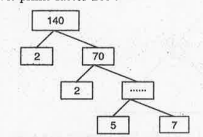If Sn denotes the sum of n terms of an A.P. whose first term is a, and the common difference is d Find: = Sn - 2Sn + S(n +2) .Solution in Punjabi
Step by step video & image solution for If S_n denotes the sum of n terms of an A.P. whose first term is a, and the common difference is d Find: = Sn - 2Sn + S(n +2) . by Maths experts to help you in doubts & scoring excellent marks in Class 10 exams.
Updated on:21/07/2023Topper's Solved these Questions
Similar Questions
Find out which of the following sequences are arithmetic progressions. For those which are arithmetic progressions, find out the common difference. :- 3,6,12,24,….
View SolutionA bicycle wheel makes 500 revolutions in moving 11 km. Find the diameter of the wheel.
View SolutionComplete the prime factor tree :

View SolutionLet S_(n) denote the sum of n terms of an AP whose first term is a.If common difference d is given by d=Sn-kS_(n-1)+S_(n-2), then k is :
View SolutionIf S_(n) denotes the sum of n terms of an A.P. whose common difference is d and first term is a,find S_(n)-2S_(n-1)+S_(n-2)
View SolutionLet there be an A.P. with first term 'a' , common difference 'd' . If an denotes its nth term and Sn the sum of first n terms, find d, if a=3, n=8 and Sn=192 .
View SolutionA sequence is called an A.P if the difference of a term and the previous term is always same i.e if an+1−an= constant ( common difference ) for all n∈N
For an A.P whose first term is 'a ' and common difference is d has nth term as tn=a+(n−1)d
Sum of n terms of an A.P. whose first term is a, last term is l and common difference is d is
Sn=n2(2a+(n−1)d)=n2(a+a+(n−1)d)=n2(a+l)
If sum of n terms Sn for a sequence is given by Sn=An2+Bn+C, then sequence is an A.P. whose common difference is
View SolutionIf Sn=nP+n(n−1)2 Q where Sn denotes the sum of the first n terms of an A.P. , then the common difference is
View SolutionLet there be an A.P. with first term 'a' , common difference 'd' . If an denotes its nth term and Sn the sum of first n terms, find n and Sn , if a=5, d=3 and an=50
View SolutionLet there be an A.P. with first term 'a' , common difference 'd' . If an denotes its nth term and Sn the sum of first n terms, find n and a , if an=4, d=2 and Sn=−14 .
View SolutionLet there be an A.P. with first term 'a' , common difference 'd' . If an denotes its nth term and Sn the sum of first n terms, find d, if a=3, n=8 and Sn=192 .
View SolutionLet there be an A.P. with first term 'a' , common difference 'd' . If an denotes its nth term and Sn the sum of first n terms, find a , if an=28, Sn=144 and n=9 .
View SolutionLet there be an A.P. with first term 'a' , common difference 'd' . If an denotes its nth term and Sn the sum of first n terms, find n and d , if a=8, an=62 and Sn=210 .
View SolutionLet there be an A.P. with first term 'a' , common difference 'd' . If an denotes its nth term and Sn the sum of first n terms, find n and an , if a=2, d=8 and Sn=90 .
View SolutionLet Sn denote the sum of n terms of an AP whose first term is a. If common difference d is given by d=Sn−kSn−1+Sn−2 , then k is :
View Solution
